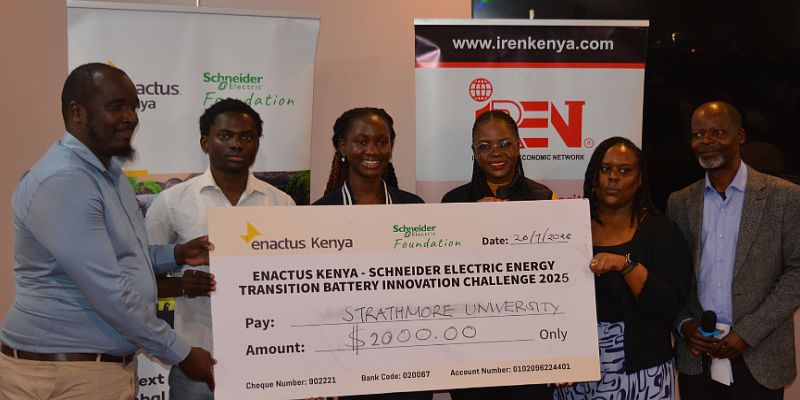Enactus Kenya Showcases Africa's Technical Ingenuity and Blueprint for A Sustainable Future

Africa faces significant challenges—energy deficits, waste management issues, healthcare gaps, and agricultural instability. Yet, these obstacles also drive innovation. At the 23rd Enactus Kenya National Competition, six teams presented practical solutions addressing these exact issues. Their projects, grounded in real-world application, demonstrate the continent’s capacity for impactful, tech-driven change
At the forefront of the energy revolution, Strathmore University's Afya Cell project clinched first place for its ingenious AI-powered, offline battery health analyzer. This innovation directly confronts the limitations of traditional Battery Management Systems, which often lead to premature degradation, safety risks, and a surge in e-waste. By dynamically optimizing charging and discharging cycles for electric vehicles, solar, and IoT systems, Afya Cell promises to significantly extend battery lifespan, slash replacement costs, and minimize environmental hazards—crucially enhancing the reliability of clean energy solutions across Africa’s rapidly expanding green tech sectors.
Close behind, Meru University offered a compelling answer to the dual crisis of e-waste and energy access. Their project focuses on recovering lithium-ion batteries from discarded electronics, then ingeniously integrating them into solar energy storage for off-grid communities. This low-cost, manual recovery method not only mitigates tonnes of e-waste but also provides renewable power, liberating households from the perils of kerosene and unsafe electrical connections.
Machakos University mirrored this pragmatic approach, securing third place by reviving and repurposing high-capacity vehicle batteries for affordable solar energy storage in schools, small businesses, and homes. Both Meru and Machakos demonstrate highly replicable models, offering sustainable power access and dramatically reducing environmental contamination in underserved, infrastructure-limited areas.
Beyond energy, Enactus Kenya also illuminated paths to improved health, circular economies, and food security. Moi University Annex took top honours with Florapatch, a truly transformative solution addressing inadequate wound care and plastic waste. Their biodegradable bandages, crafted from banana fibers and infused with natural healing agents like aloe vera, turmeric, and honey, present a sustainable, low-cost alternative perfectly suited for rural and low-income populations. This innovation holds immense potential for scalability across African medical supply chains, leveraging local materials for a greener healthcare future.
The University of Nairobi’s Queening Afrika project tackled another pervasive waste problem: synthetic hair braids, which contribute over 5,000 tonnes to landfills annually. Their brilliant strategy involves upcycling this plastic waste into high-quality bags and mats, produced by collectives of women and youth artisans. This initiative not only diverts substantial environmental pollutants but also catalyses economic empowerment and job creation, particularly for young mothers. Its scalability, through salon partnerships and eco-conscious consumer markets, is enormous.
Finally, Maseno University’s Smart Farm AI confronted the trifecta of low agricultural yields, unpredictable climate, and the digital language barrier. Their voice-activated farming assistant, accessible in local languages, provides vital weather updates, agronomic advice, pest diagnostics, and an integrated e-marketplace with M-Pesa functionality. This inclusive platform promises to boost farm productivity, market access, and food security across diverse rural and multilingual communities.
These projects demonstrate a practical grasp of Africa’s specific needs, applying targeted, technical solutions that actually fit local realities. Instead of treating waste as a problem, they repurpose it as a resource. Solutions range from extending battery lifespan and delivering clean energy, to improving healthcare infrastructure, unlocking economic value from waste streams, and making agricultural knowledge widely accessible. Each initiative is engineered for long-term impact and operational sustainability.
The six Enactus Kenya National Competition entries aren’t just theoretical—they’re operational models for scalable, youth-driven innovation. They prove that complex problems in Africa can be tackled with context-aware technology and local ingenuity. As these projects expand, they’ll drive measurable change, setting a precedent for future technical solutions built in, and for, Africa.
Enactus Kenya is a dynamic network of university students, academic advisors, and business leaders dedicated to using entrepreneurial action to create a better world. Enactus Kenya, a vibrant chapter within the global Enactus network, was launched in 2003 following an MOU between then SIFE International (Now Enactus International) and the Inter Region Economic Network. University teams, guided by faculty advisors and supported by business leaders, identify local societal problems and develop sustainable, market-driven solutions. Their activities are rooted in the belief that economic empowerment and individual initiative are crucial for long-term social and environmental progress.
